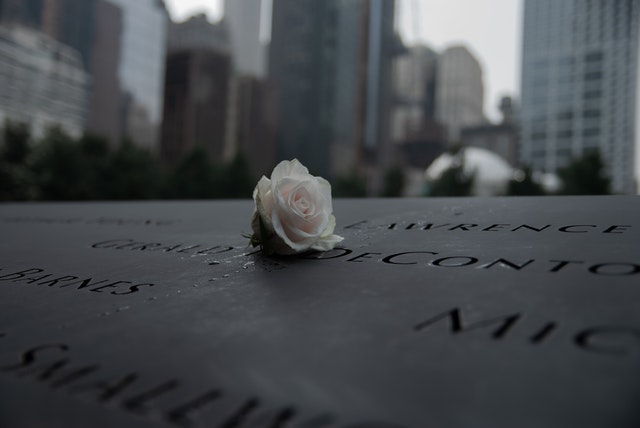
The definition of bear: to carry the weight of; support; endure
September 11, 2001 didn’t have a direct impact on me. Other than making phone calls trying to ensure the safety of my husband’s nephew who was attending the US Naval Academy at the time, I had no personal connection to anyone who was affected. The first direct impact happened several years later when a young veteran had returned home from Iraq and was cowered in a corner of an Intro to Psych class I was teaching for the local community college. The topic of lecture that day was post-traumatic stress. He spent the hour painstakingly hidden behind a computer monitor and after class ended he approached me with much reticence. He asked if I knew how he might “get some help”. That was the first time I began to bear witness of September 11, 2001 as I watched a multitude of people throw themselves into carrying the weight of losses that day by fighting back against tragedy in whatever ways they could. In the next 7 years that scenario repeated itself more times than I can count. Young men and women would serve, separate from the military and return home to attend school. Their service would begin catching up with them and their bodies were keeping a score too high to hold. First-responders would filter from NYC to the community where I lived just east of the Smoky Mountains and seek new life in the form of changed vocations. This “psych” instructor who was also a practicing therapist seemed a logical place to begin dumping the score that was too heavy to bear.
It made perfect sense that, in June of 2008, as the post-9/11 wars drudged on I would seize the chance to immerse myself in motor pools and tarmacs. I was a well-trained therapist and now my training was stretched by tragedy. The ripple effects of that day are nearly endless. On September 11, 2001 lives were forever changed. One by one, as they would tell their stories of impact, I tried to listen with all my might and really learn what it meant to bear witness. I began to journal and blog as my own “dust off” project, keeping myself buoyant for the next stories that would come my way. What I could easily release through writing, the survivors of 9/11 and all the wars, suicides, and losses that were its ripple effect, could never release for good. Their awareness of tragedy would become their lives.
While I can’t offer exact accounts of specific stories I’ve heard, the following provide a snapshot of what might be heard when we bear witness:
My thoughts on May, 2014: “I heard about what happens to the souls of men and women who watch a comrade die in their arms. I heard about the guilt felt that their mission had now added to a lifetime of sorrow for more Gold Star families. I reflect on heartache so palpable that day it nearly sounded like drums beating a faded cadence”.
My thoughts on June, 2014 as the stories kept coming: “Having listened to hundreds of warriors talk about war, I now know that in order to thrive in combat a soldier must manipulate the soul – sacrificing pieces of it when having to take a life or cutting off access to it in order to push ahead with the mission.”
If I could wrap up all the stories from first response personnel it might sound something like this: “I feel stuck. Stuck in my fear. Stuck in that tower. I’ve fought so many fires, seen so much danger. Why did this one hurt differently? I think it’s because I’d never felt so helpless before. I can’t do helpless, yet that’s all I ever feel now“.
For some, the practice of remembrance – especially so many years later – can be overwhelming. It can be hard to understand why the stories need telling again and again. Trauma is stored in both our minds and bodies. If the trauma is severe enough, it can take years for the body to translate the tragedy into words. For many, it can remain unspeakable for decades. Yet, years of studying how victims of atrocity do heal includes learning about the transformation that takes place between a person telling their story and the willingness of the listener. Famed psychiatrist, teacher, and author Judith Herman reminds us that “…….the talking cure is predicated on the existence of a community willing to bear witness”. I believe we must take her words to another level. Sometimes what the survivor needs is not just a listener, but someone who will sit with them while the words of their story take shape. In sitting with them through their silences and tears, we are holding for them what is too heavy to hold alone. We must be a community willing to hold the stories for as long as needed – an eternity if need be – in order for healing to take place. When someone is willing to bear witness to our pain, they agree to hold for us the weight of that pain while we shift and adjust.
I wasn’t directly affected by the events of 9/11, but I was forever changed by the stories those events created for others. A friend and colleague called me recently needing to tell me about some stressful events she’s living through and thanked me for “just listening“. She commented that she wasn’t sure why she felt the need to “tell it all” to me. She needed me to bear witness. May our willingness remain forever present.
“Without a witness, it just disappears.” – the character of Charles in the movie titled “Taking Chance“
If you or someone you know is struggling, the listeners on the end of this phone number can help guide you to places that can help:
National Suicide Hotline: 1-800-273-8255

